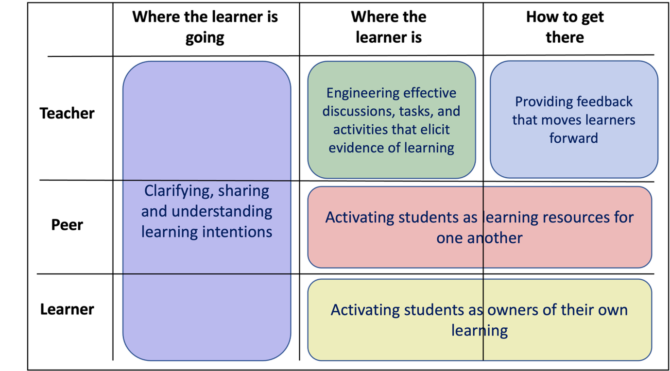Embedding Formative Assessment (EFA) programme
The Embedding Formative Assessment programme, is the only whole school programme with proven impact at GCSE in an EEF research trial.
- Research shows committing 1% of teachers’ time to working in Teacher Learning Communities results in two additional months of progress for your students
- Suitable for all schools, all phases
- Fully supported programme with regular contact and training from EFA expert
- Direct focus on post-Covid recovery for all learners
- A shift from curriculum intent to implementation
Better Evidence = Better Decisions = Better Learning

Everyday teaching activities are habit based – questioning, sharing learning intentions and using our preferred techniques. The routines we develop from these repeated behaviours may not always be as effective as we hope. Providing the time and space for teachers to reflect on their habits of formative assessment will lead to better learning and improved student outcomes.
The EFA programme, based on 30 years of research and developed by Dylan Wiliam, Siobhan Leahy and SSAT uses Teacher Learning Communities (TLCs) to ensure regular structured time is dedicated for staff to meet, learn, and support changes in practice.
‘Make habit change your goal. The Embedding Formative Assessment programme is a two-year commitment of just 1% of teachers time to increase the rate of learning by 25%‘
Evidence informed practice is used frequently across schools in the UK. Teachers and school leaders are actively seeking out research to identify the ‘best bets’ to implement in the classroom. Maximise the impact of your recovery or pupil premium funding by implementing the Embedding Formative Assessment programme.
Evidence informed practice should start inside the classroom, by asking three questions:
- Do I collect evidence of learning for all learners in every lesson?
- How do I respond to the evidence I collect?
- What impact does this have on learning?
1. Do I collect evidence of learning for all learners in every lesson?
To move learning forward, we must find out what students already know. We can’t predict what students will learn in a lesson; we don’t know what’s inside their heads. This isn’t easy as many students are reluctant to share their thinking. Teachers need to embed a range of techniques into the learning process to collect better evidence to inform the next steps in teaching.
‘Join the 150 schools maximising the impact of every lesson and making a bigger difference to their students learning by signing up for the Embedding Formative Assessment programme ‘
2. How do I respond to the evidence I collect?
Feedback from students is a waste of time if it’s not acted upon. This is the big idea of formative assessment, that evidence about learning is used to adapt teaching to better meet students’ needs. These needs have become more varied since the pandemic.
The evidence collected must lead to a response to address gaps in knowledge or problems identified. Teachers need to be clear on what is critical within a lesson or series of lessons through quality learning intentions and have curriculum time built in for actions to be taken.
3. What impact does this have on learning? How do I know?
Teaching must be a highly responsive process where teachers adapt lessons, moment-by-moment and day-by-day. This involves changing teachers and students’ behaviours in the classroom. We need to continuously check understanding, deepen thinking and elicit reasoning to ensure learning moves forward which returns us to question one.
The five key strategies of formative assessment summarise this:

Teacher habit change takes time. As in the classroom, it’s not just what we do, but how you do it that matters. Successful implementation of the programme requires schools to pay regular attention to specific additional activities, this is where SSAT’s support is here for you.
EFA Funding Available:
Due to funding from the Education Endowment Foundation (EEF), through the DfE’s Accelerator Fund, we are able to offer a limited number of schools with a secondary phase based in the Regional Schools Commissioners (RSC) regions of the North of England, East Midlands and the Humber, and West Midlands funding for the fully supported Embedding Formative Assessment (EFA) programme.
For more information on EFA including how to apply contact our dedicated team on hello@ssatuk.co.uk, or visit us here.
















Your thoughts